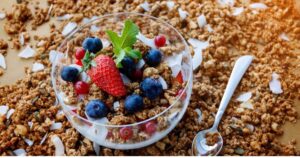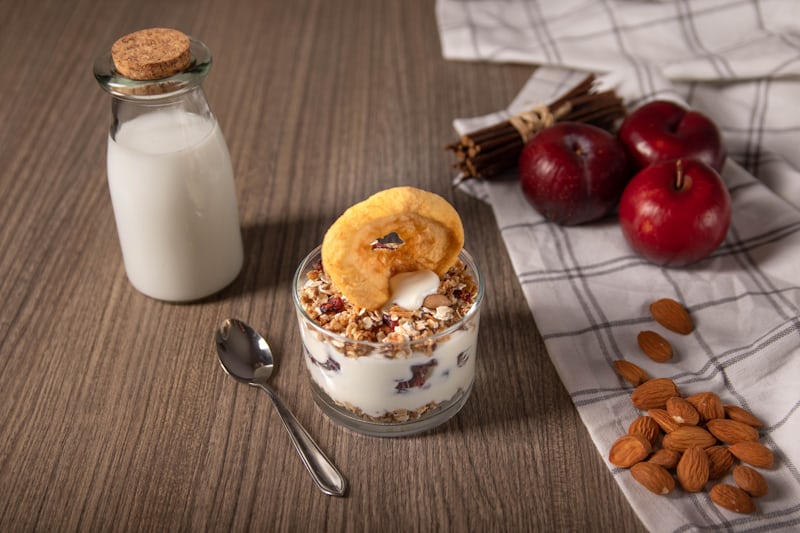Why late-night snacks affect blood sugar
Blood sugar naturally fluctuates throughout the day. For many people, going to bed hungry or eating high-carbohydrate snacks late at night can result in spikes or dips in glucose levels. Choosing a snack with a mix of protein, fiber, and healthy fats can help slow digestion, providing a steadier release of glucose and reducing overnight fluctuations.
Timing is key: a small snack 30–90 minutes before bed can prevent blood sugar dips without overloading your system. Pairing carbs with protein or fiber is essential to avoid sudden spikes.
Key points:
- Smart late-night snacks can prevent overnight dips and reduce spikes.
- Protein, fiber, and moderate healthy fats help steady glucose.
- Portion size and timing (30–90 minutes before bed) are crucial.
What makes a snack “smart” for blood sugar?
A dietitian considers three main factors: low-to-moderate glycemic impact, sufficient protein, and fiber content. For example, a small bowl of lentil soup provides both protein and fiber, Greek yogurt with a few chia seeds offers protein plus slow-digesting carbohydrates, and a handful of nuts with a low-GI fruit adds healthy fat with moderate carbs. Convenience and taste also matter — the snack should be something you actually want to eat.
Using reliable sources like Harvard T.H. Chan School of Public Health or PubMed studies on lentils shows that plant-based protein sources with fiber can help moderate post-meal blood sugar responses.
Key points:
- Protein + fiber = slower glucose absorption.
- Low-to-moderate GI carbs reduce spikes.
- Choose snacks you enjoy to make consistency easy.
Dietitian-approved late-night snack ideas
Here are several examples of smart late-night snacks suitable for maintaining better blood sugar levels:
Lentil-based warm snack
One of the simplest plant-based options is a small bowl of lentil soup or a light lentil stew. Using split red lentils or yellow moong dal makes digestion easier. A warm lentil snack is comforting and supports steady overnight glucose release.
Example serving: 40 g dry lentils (~1/4 cup), cooked with water, mild spices, and a teaspoon of olive oil. This provides around 10–12 g protein and 6–8 g fiber. Check the nutrition details on USDA FoodData Central.
Greek yogurt with seeds or berries
Plain Greek yogurt (~150 g) with 1 tsp of chia or flax seeds and a few blueberries provides a balanced snack: protein, fiber, and slow-release carbohydrates. Avoid flavored yogurts with added sugar. This snack keeps you full without causing a spike in glucose, as highlighted by resources like EatingWell.
Hummus with raw vegetables
A moderate serving of hummus (40 g) with cucumbers, bell peppers, or celery offers protein, fiber, and healthy fats. Portion control is important as hummus can be calorie-dense. According to Healthline, this pairing is ideal for steady blood sugar overnight.
Nuts and fruit
A small handful of unsalted mixed nuts (20–25 g) paired with half an apple or pear adds protein, fiber, and healthy fats. Keep portions in check to avoid extra calories. This combination helps maintain stable glucose levels while satisfying sweet cravings.
Cottage cheese (paneer) with herbs
Low-fat cottage cheese (~100 g) with black pepper or a squeeze of lemon provides slow-digesting protein (casein), which gradually releases amino acids overnight and supports balanced blood sugar.
Key points:
- Lentil soup, Greek yogurt with seeds, hummus with veggies, nuts + fruit, or cottage cheese are all dietitian-approved.
- Moderate portions are critical for avoiding glucose spikes.
- These snacks combine protein, fiber, and healthy fats for steady overnight blood sugar.
Timing and portion guidelines
Eat your snack about 30–90 minutes before bedtime. Keep the calorie range between 100–250 kcal depending on your overall daily needs. Protein per snack should be around 7–15 g, and fiber around 3–6 g. These measures help prevent overnight dips or spikes.
Key points:
- 30–90 minutes before bed is ideal.
- Snacks should be 100–250 kcal.
- Protein 7–15 g, fiber 3–6 g for optimal effect.
Practical tips and cautions
Pair your snack with water or unsweetened beverages, not sugary drinks. Avoid fried or high-sugar foods late at night. If you are taking insulin or glucose-lowering medications, consult your healthcare provider, because snacks can prevent nocturnal hypoglycemia but may require medication adjustments. Additional guidance is available at Mayo Clinic and Joslin Diabetes Center.
Key points:
- Avoid sugary drinks and fried snacks late at night.
- Consult your clinician if you take blood sugar medications.
- Keep snacks simple, portion-controlled, and balanced.
You can also read:
5-Day Diabetes-Friendly Anti-Inflammatory Meal Plan for Beginners
Smart Late-Night Snacking: How It Can Support Better Blood Sugar Levels
Frequently Asked Questions (FAQs)
Will a late-night snack make me gain weight?
Not if portions are moderate and calories fit your daily needs. Smart snacks can prevent overeating and support better sleep.
Can I eat fruit at night?
Yes — choose low-GI fruits like berries, apple halves, or pear and pair with protein or fiber.
Is bread okay with these snacks?
Prefer whole-grain and keep the portion small (10–15 g carbs) to avoid spikes.
I’m on insulin — can I snack before bed?
Discuss with your healthcare provider. Snacking may prevent low glucose but may need medication adjustments.
How often should I have a bedtime snack?
Only when hungry or prone to overnight dips. Daily snacking isn’t mandatory for everyone.
Conclusion
Smart late-night snacking can help support better blood sugar levels overnight when done thoughtfully. Choose snacks with protein, fiber, and moderate healthy fats, like lentil soup, Greek yogurt with seeds, hummus with veggies, nuts with fruit, or cottage cheese. Portion size and timing are key. Always consult a dietitian or clinician if you have medical conditions or take glucose-lowering medications
Disclaimer
The content in this article is for general informational and educational purposes only and is not intended as medical advice. Always consult a licensed healthcare provider, registered dietitian, or physician before making any changes to your diet, exercise, or medication routine, especially if you have diabetes, other medical conditions, or are taking prescription medications. The author and website are not responsible for any adverse effects or consequences resulting from the use of any recommendations in this article.

